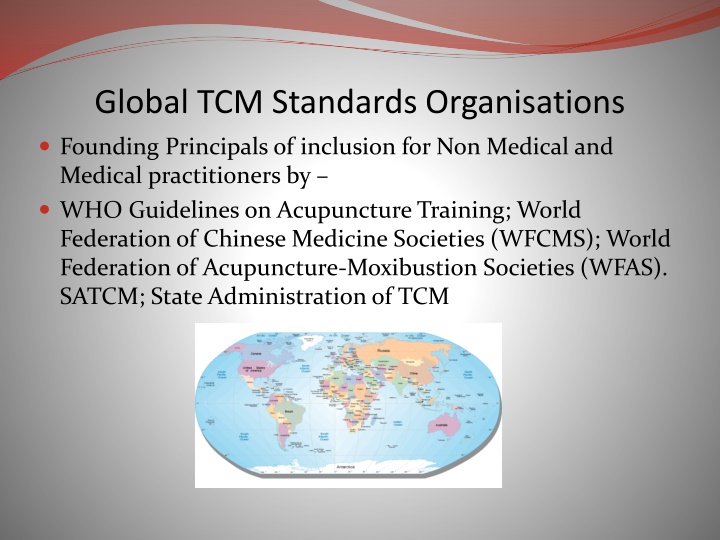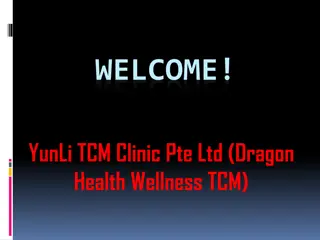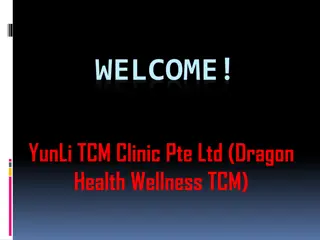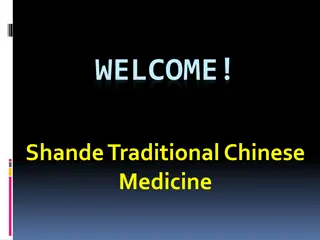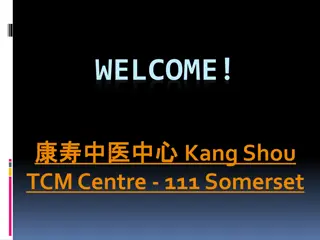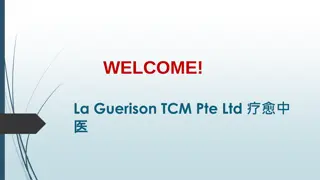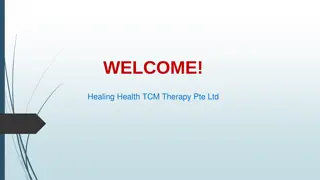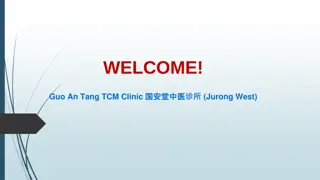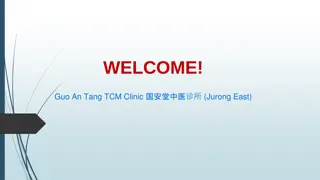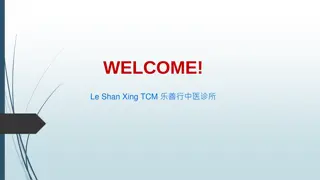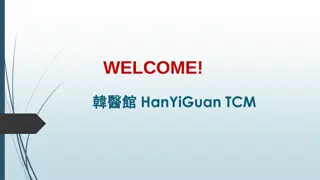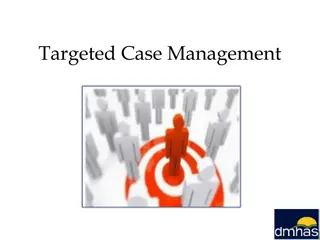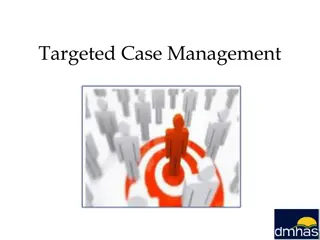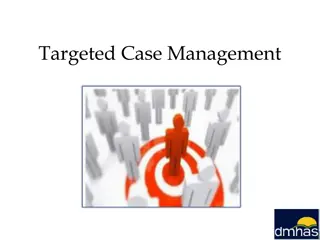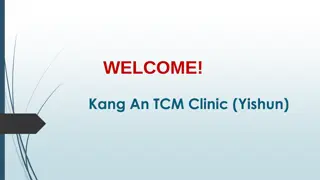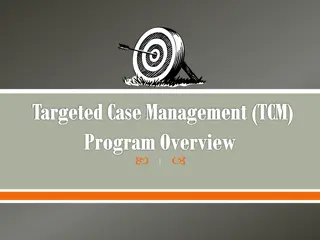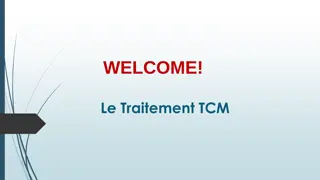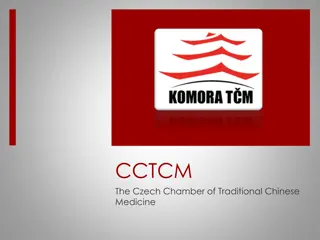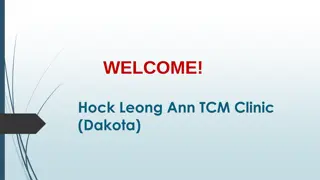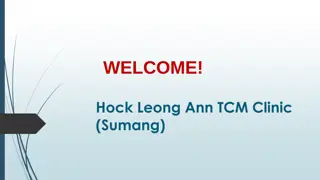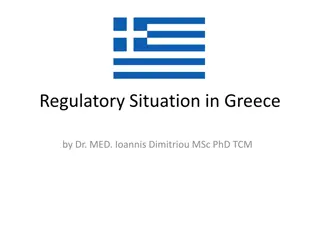Global TCM Standards Organisations
Founding principals of inclusion for non-medical and medical practitioners by WHO guidelines on acupuncture training. Explore the challenges in the CAM sector in Ireland, the UK, and the EU regarding public safety, sector discrimination, lack of regulation, and government support. Learn about the EU's hands-off approach and the Irish government initiatives on CAM therapies.
Download Presentation

Please find below an Image/Link to download the presentation.
The content on the website is provided AS IS for your information and personal use only. It may not be sold, licensed, or shared on other websites without obtaining consent from the author.If you encounter any issues during the download, it is possible that the publisher has removed the file from their server.
You are allowed to download the files provided on this website for personal or commercial use, subject to the condition that they are used lawfully. All files are the property of their respective owners.
The content on the website is provided AS IS for your information and personal use only. It may not be sold, licensed, or shared on other websites without obtaining consent from the author.
E N D
Presentation Transcript
Global TCM Standards Organisations Founding Principals of inclusion for Non Medical and Medical practitioners by WHO Guidelines on Acupuncture Training; World Federation of Chinese Medicine Societies (WFCMS); World Federation of Acupuncture-Moxibustion Societies (WFAS). SATCM; State Administration of TCM
Strong EU Demand for Treatments In Ireland, the UK and the English speaking world .CAMbrella (2012), This is reflected in a similar steady and constant demand reported across the EU Ernst & White (2000), WHO(2005), DOHC (2002), DOHC (2005). CAMbrella (2012)
Public Safety and Sector Discrimination The CAM sector in Ireland has no formal or legal status, no registration of therapists, or recognition of their qualifications, and no official oversight on their training and practice. This lack of recognition and professional status is replicated in the UK, EU and most of the western world.
No Regulation or Government support Despite consumer choice Acupuncture and CM in most of the EU remains unregulated and unsupported by successive governments ,. Budd & Mills (2000 Pg 8). national registers of adequately trained practitioners - citizens in Ireland and the EU must search for competent and safe practitioners ,. CAMbrella(2012). No
EU has a hands off approach NO EU guidance to member states on possible structure or framework options for sector regulation and practice - noted in the CAMbrella Report to the EU (2012).
Eu Resolution 1997 EU called for a process of developing structures for recognising non- conventional medicines. Contradicted by the EU Treaties of Rome and Lisbon which stated that each member state has the responsibility for their own health policies. No willingness to harmonise regulatory structures within EU.
Irish Government Initiatives The period between 2001 and 2006 was the most active for Irish government initiatives into CAM therapies. 2003 2006 and a National Working Group on the Regulation of CAM Therapists published recommendations for regulation. DOHC (2002, Pg 5). No action on recommendations.
Opposition to CAM(ACU-CM)Regulation Opposition by the biomedical healthcare sector to any government recognition of CAM therapies. Efforts to restrict, obstruct or reduce the levels of recognition for CAM therapies are common not only in Ireland but in many countries in the EU and elsewhere. Vasquez (2006 P2)
Adult Learners _ No recognition? Academic Validation of Courses Have any courses in your therapy achieved academic validation of their courses at any level? No Academic Validation 64.2% Non Irish Academic Validation 35.8%
Recognition of Acu/CM/CAM 1.2 1 0.8 Australia Brazil Canada New Zealand 0.6 South Africa US Ireland 0.4 UK 0.2 0 No Recognition Limited Recognition Full Recognition
Recent European changes Hungary / Slovenia Medical doctors only - Portugal New CAM Regulation Not Healthcare treatments taxed. Switzerland Government Recognition and equal status to medical doctors. Included in healthcare.
Acupuncture/CM - Models of regulation - limited options as we as outside of what some call the orthodox healthcare sector.
Professional Regulation How is professional practice of your therapy or therapies if more than one regulated in Ireland? Voluntary self regulatory association with agreed codes of ethics and practice 96.3% No Organised Regulatory Structures 3.7%
Professional Accreditation Yes the course(s) are professionally accredited (submitted their curriculum to the association for approval and took part in and/or accept the principles of resource and course inspection) 56.7% The associations approve and recommend the course(s) as their members have successfully completed the course(s) and are familiar with the standards 35.1% No Professional Accreditation
Patients are confused Public Awareness Do patients who seek treatments ask about regulation or registration of the practitioner? 80% 70% 60% 50% 40% 30% 20% 10% 0% They Always Ask 3% They rarely ask 75.4% They Sometimes Ask 21.6%
What does the sector say they need. Ward (2014) Sector Needs 100% 90% 80% 70% 60% 50% 40% 30% 20% 10% 0% Recognition National Registration CAM Official Regulatory Body Academic Validation of Training
We cannot have progress as Acupuncture and Chinese Medicine Professionals without a regulatory structure
National registration, Protection of title, Practitioner status, Inclusion in healthcare planning and budgets, Inclusion in healthcare delivery to the public. Defined as Authorised Health Professionals by the EU
National register of practitioners Protection of title, Inclusion in wider healthcare sector (planning, budgets, delivery) Exclusion from taxation of treatments.
in higher education. Designation as EU authorised health professionals. Light touch regulation, Self funded by the professions, No financial pressure on budgets, and would provide National Register of practitioners. Protection of Title Access to government healthcare programmes Academic validation of training courses
PEFOT member countries need the active support of the federation. Activate PEFOTS policies to support members regulatory efforts.
Through an active representative organisation like PEFOTS we can all help each other in our national battles.
Bernadette Ward, PhD, Education) Dublin City University. Irl MSc, (Traditional Chinese Medicine) Middlesex University, UK Lic. Ac, Dip Herbs, (AFI - Nanjing University) Vice President PEFOTS. Chair, PEFOTS Education Committee. Email: bwardafi@hotmail.com www.bernadetteward.com
